Segun Akinola Interview – Regeneration
The world’s longest running science fiction programme, Doctor Who, has undergone its biggest refresh ever, with Jodie Whittaker in the role of The Doctor. The new series has been scored by BAFTA Breakthrough Brit 2017 Segun Akinola, who took on the daunting task of defining a new, but familiar, sonic universe… It’s one of the […]
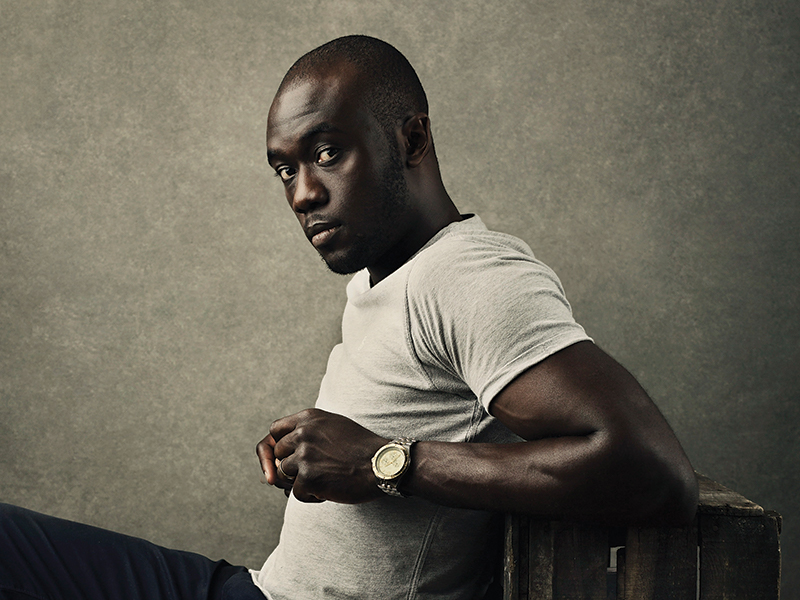
Image: David Shoukry
The world’s longest running science fiction programme, Doctor Who, has undergone its biggest refresh ever, with Jodie Whittaker in the role of The Doctor. The new series has been scored by BAFTA Breakthrough Brit 2017 Segun Akinola, who took on the daunting task of defining a new, but familiar, sonic universe…

It’s one of the BBC’s oldest and most beloved programmes. Now, Doctor Who has undertaken its most comprehensive regeneration to date, with the show’s first female lead, Jodie Whittaker, portraying The Doctor and a brand new creative team establishing a fresh tone for the show. The series, currently airing on Sunday evenings on BBC One, has been scored by composer Segun Akinola, who has been working – in secret – on the new series for the best part of a year. MusicTech asked Segun how his journey to this dream job started, beginning with his earliest music-making memories.
“Well, when I was quite young my dad literally came home one day with a keyboard and said ‘do you want to learn the piano?’,” says Segun. “So I said ‘yes!’. But growing up attending church, my real love was the drums. I loved seeing them being played every week. A few years after I played piano I got the opportunity to learn the drums. From that point onwards my musical education was varied. From playing in my school orchestra to the big band stuff, to musicals and playing in church. I’m incredibly grateful for that because I think all those experiences shaped me musically, and made me the composer I am today.”
The Journey Begins
Segun’s trajectory into being a soundtrack composer was also influenced by his love of narrative. “I always loved English and creative writing. I read books all the time and I loved film and then I really kind of got into film scoring. Eventually, I studied composition at the Birmingham Conservatoire and the National Film and Television School, it was then that I got to know many producers and directors and started to work in film and TV.”
Segun’s early work established him as a dynamic composer, creating textured soundtracks for documentaries, including BBC One’s Panorama and several short films. But it was his work on Black And British: A Forgotten History that really put his name on the map, as Segun explains: “I think the most important music I’ve done to date, before Doctor Who is definitely the score for Black And British: A Forgotten History. I think, in a way, working on that really helped me to express a number of different aspects of my voice as a composer. It opened up a lot of doors for me professionally, including the BAFTA Breakthrough Brit scheme, which was a really amazing thing to go through and really led me to where I am today.”
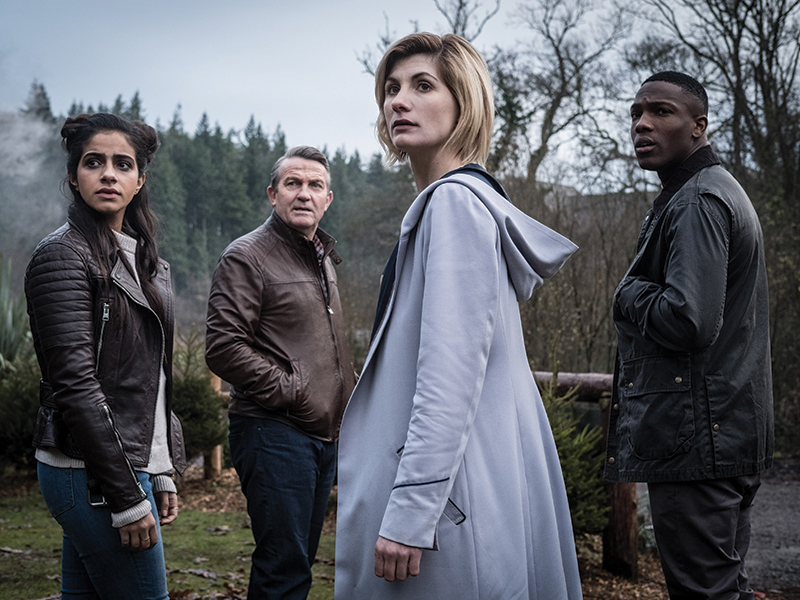
The Police Box Calls
So how did Segun land the coveted Doctor Who gig? “I quite literally got a call from the BBC one day saying that I was being considered for it, and that the execs would like to speak to me, and would it be OK for them to pass on my number?” Segun recalls. “I obviously said ‘yes!’ straight away, it was then a very, very surreal moment, but obviously a great moment that I’ll remember for years to come.”
Segun admits that he didn’t have many friends who watched Doctor Who. As such, he never had any encouragement to tune in. “But I’ve always known about it, of course,” he adds. “I admired the show’s importance and its place on the televisual landscape. For a long time I’ve had a great appreciation for the Radiophonic Workshop and the pioneering work they did back in the 1960s, as well as Murray Gold’s fantastic work for the show. (Doctor Who’s outgoing composer from its relaunch in 2005 up to 2017). So yes, I’ve always known about it but have learned a lot over the last few months.”
Segun’s appreciation of the Radiophonic Workshop’s innovative approach has encouraged him to push the boundaries with his score.
Segun’s impressive new title theme arrangement, resplendent with those original Radiophonic Workshop elements“For this new series we’ve really approached it all with a ‘clean-slate’ mindset,” he continues. “So we really started from the beginning. I was definitely inspired by the ethos of experimentation that the Radiophonic Workshop embodied. I’ve been really keen to carry on that same spirit that they had when composing for this series, but in my own way.
“During the compositional process I’d ask questions such as ‘I wonder what this will sound like’ or ‘if I just did this, what would happen to the sound?’ I’d run things through unconventional plug-ins to see what happens when I approach things differently and challenge myself. I wanted to have that same spirit of invention that Doctor Who’s original composers had, but to make everything sound completely fresh for today’s audience.”
Segun’s arrangement of the legendary title theme is the perfect crystallisation of this ethos, with the very noticeable original elements of the music composed and recorded in 1963 [salvaged and digitised as usable stems by Mark Ayres, the BBC Radiophonic Archivist.] sitting in a synth-bass heavy mix that has a huge sound.
As the new series is more experimental, MusicTech asks Segun if that means there won’t be unique musical themes for certain characters? “Oh yes, we do have character themes for The Doctor and her new companions that will pop up in various episodes,” he explains. “There’s also ‘series’ themes across the ten episodes when specific, recurring things happen.”
Freedom to Experiment
Hearing the music in context cements this point. While certain cues – such as that for episode one’s terrifying antagonist ‘Tim Shaw’ – contain jagged, in-your-face synth sounds, that evoke the Radiophonic Workshop, others are more melodious. One case-in-point is The Doctor’s new theme, which is a haunting yet glorious piece of music that works in tandem with Jodie’s performance to emphasise the magic and enthusiasm of her new personality.
“The whole process has been an extremely amazing and enjoyable collaboration working with [Doctor Who’s new show-runner] Chris Chibnall and other members of the production team,” says Segun.
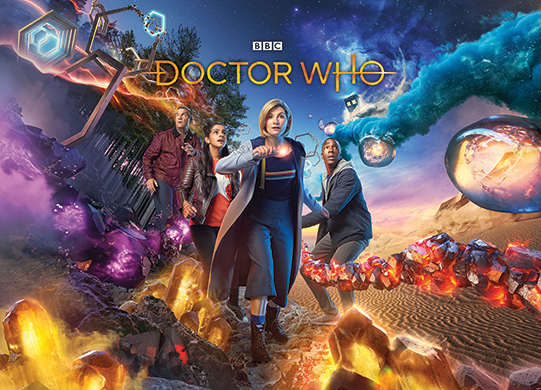
The Doctor Will See You Now
“Discussing the stories and ideas has been a great deal of fun,” he continues. “The team have given me so much latitude to experiment and the freedom to be creative. They made it clear from the outset that they wanted me to bring myself to it. But it’s not like they’ve just said, ‘Oh just write some music’ and that’s it. They’ve been really actively involved, listening and giving feedback on the compositions. Bringing this new version of Doctor Who to life has been a real team effort. We’re all trying to do what’s best for the show.“
So what tools did Segun use to create the new score? “My studio is my creative hub, but everything is built around my computer really,” he says “I might get my guitar out and write something on there, or I’ll have a few instrumental samples that I’ll play with using a MIDI controller. For me, it’s about finding a ‘sound’ or melody/motif or chords and then just exploring it. Everything goes into software. So I’d say that my computer is the cornerstone.”
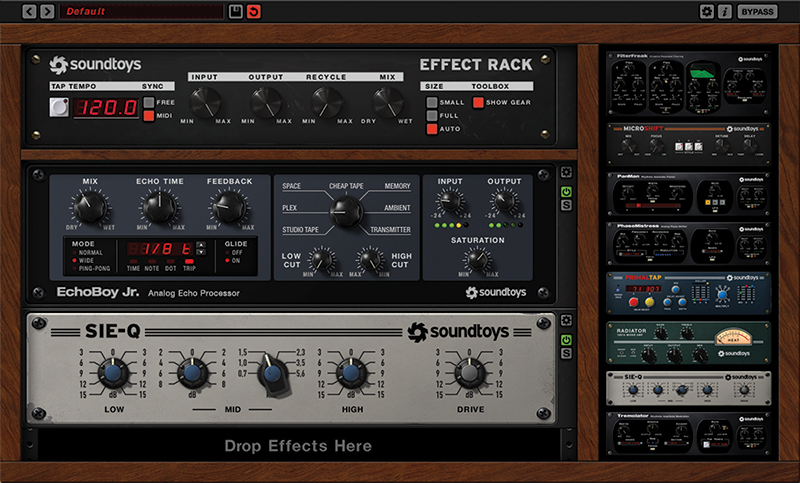
Segun uses Logic Pro X and Pro Tools, writing mainly in Logic and using Pro Tools to host video and bounced compositions once he’s written them.
“If we’re talking about plug-ins then I really love everything that SoundToys have made. I use their plug-ins and effects on literally everything. In terms of instrumental samples then I use many of the higher-profile professional packages. I use Spectrasonics’Omnisphere, Cinesamples and a couple of Spitfire’s orchestral libraries, which are great. For Doctor Who in particular, I’ve used a lot of Lexicon reverbs and some nice Waves reverbs on almost all of the tracks.”
Segun adds: “I’ve actually constructed many of my own sample collections for my own use. I’ve made pads out of plucked piano strings and that kind of thing.”
Creative Core
With this roster of tools, how easy is it for Segun to get going on creative ideas when working on projects in general? “Well that really depends on when I get involved with a project. If I’m involved early enough then I will read the scripts and generate ideas based on that, along with discussions with the director or the producer. But if I get involved a bit later then I’ll watch the rough cut and talk to the creatives involved, including the editor. I might not necessarily write to picture. If there’s time, I’ll just write a piece of music that embodies what we’re trying to do with the film or the show. This may be the main theme or the lead character theme. I’ll then progress into writing to the picture.”
Once the compositions are complete, everything (for Doctor Who) is mixed by Goetz Botzenhardt and Olga Fitzroy, who are part of the Air Management team. Segun mixes all his demos and provides stems from those for Botzenhardt and Fitzroy to work from. He also sends any additional live material that has been recorded. “I have a couple of great assistants who prepare all the Pro Tools sessions for Goetz and Olga and also for the dubbing mixer,” Segun says.
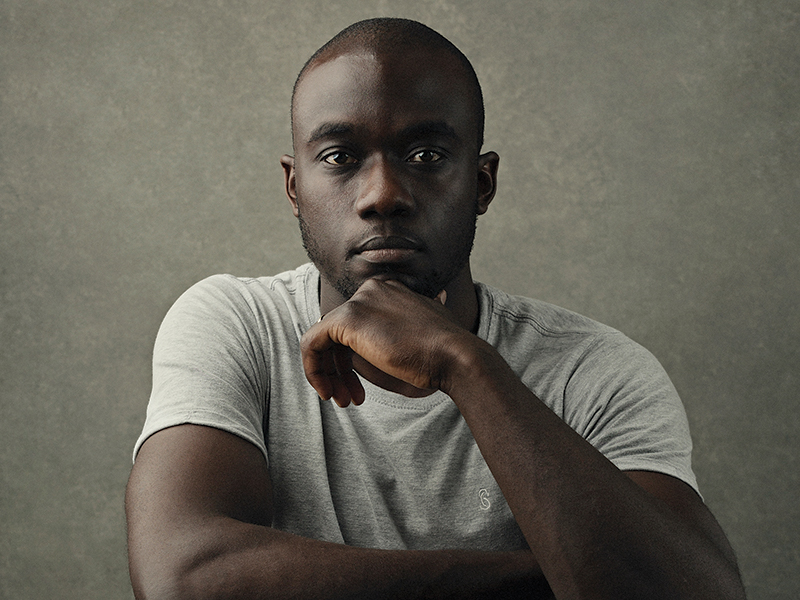
Under Pressure
Segun says that composing for scripted drama differs significantly from composing for documentaries in terms of the hierarchy of those in charge, the number of people involved, the available time for post-production and how the music fits in. “But the key principles are fundamentally the same… people just want great music that fits their vision and the story they’re telling.”
Stepping into such a high-profile role has been difficult and easy in equal measure, says Segun. On one hand, the excitement of the job and the fact that everyone involved is a pleasure to work has made it easy. But alongside that there is the pressure of working on such a beloved show as Doctor Who. “As much as I might try not to think about the magnitude of it, it’s quite difficult not to sometimes but eventually the sheer joy of it just takes over. Once that happens, it’s all fine!”
Segun says he was fortunate to have “quite a lot of time” to think about the music and to try some early experiments. “That was all really helpful… it gave me the chance to think about where the music should go and where the various musical strands will lead to. It also gave me a chance to get to know the characters and consider their themes, and come up with the best ways to represent their characters. I probably spent around two or three months just doing all of this before I opened up episode one and began the actual writing-to-picture process.”
MusicTech asks Segun what his longer-term career plans are “I like to keep moving forward and making new things,” he says. “I really do think that I haven’t made my ‘best’ work yet. I think that’s all still to come and I’m still working hard to achieve that.”
A Brief History of Time, Space and Sound
Back in 1963, the BBC Radiophonic Workshop was massively ahead of the curve. Doctor Who’s famous title theme, which was composed by Ron Grainer, was amongst the first electronic pieces of music devised for mainstream consumption. The piece was recorded via painstaking physical techniques – and much looping of tape – long before synthesisers became commercially available.
Despite the prominence of the Radiophonic Workshop in any discussion of Doctor Who’s musical legacy, the majority of the classic series episodes from 1963 to 1981 had music created by freelance composers, many of which were composed with a sense of quirky experimentalism. The Radiophonic Workshop itself took on the task of crafting the incidental, synth-heavy music throughout the 1980s until the tail end of the classic series’ run, when sound engineer and composer Keff McCulloch took over until the show’s untimely end in 1989.

When the show was relaunched in 2005, so too was the approach to the music. Composer Murray Gold was notable for his cinematic, sweeping and often epic scores which gave the show the sense of scale that it needed to compete in a modern televisual landscape. Throughout his twelve years on the show, Gold would also compose more delicate, tender character themes that served to double-underline the emotional heart of the show.
Segun Akinola’s approach marries these two worlds perfectly. Doctor Who‘s music in 2018 sounds big and contemporary as Gold’s work did, but it is also experimental, inventive and sonically audacious.
Reassessment
Segun believes he has been “really blessed” to be able to achieve so much with this new series of Doctor Who. The experience has led him to reassess everything, he says. “I just want to work with great people and help to tell great stories. For me, the people aspect is just as important as the story. I would like to do something smaller outside of film and TV work, but I’m not sure what that is yet. I’d love to write string arrangements for a few artists, but I’m having so much fun working on Doctor Who, that is my primary focus right now. As for series 12, who knows? I’m on my very best behaviour though! So we’ll see…”
For anyone aspiring to be a composer on a high-profile series such as Doctor Who, what advice would Segun give? “I think I would say work really really hard – treasure your friends and your family because none of this means anything without them. Be a life-long student of music. Listen to everything you can. Be the best that you can be – not just as a composer but as a human as well.”